Congratulations to Magdalena Delgado who successfully defended her dissertation entitled “Characterization of cell death induced by microtubule targeting agents in primary acute lymphoblastic leukemia cells” on April 24th. Magdalena is a student in Timothy Chamber’s lab.
News
On the Cover
Congratulations to first author, Jun Gao, and other members of Kevin Raney‘s lab on their manuscript, DEAD-box RNA helicases Dbp2, Ded1 and Mss116 bind to G-quadruplex nucleic acids and destabilize G-quadruplex RNA, that is featured on the cover of Chemical Communications.
March Publications
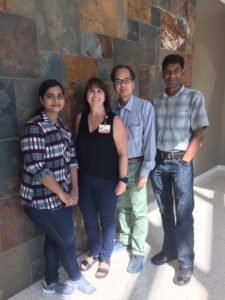
Generation of a Fully Human scFv that binds Tumor-Specific Glycoforms.
Lu Z, Kamat K, Johnson BP, Yin CC, Scholler N, Abbott KL.
Sci Rep. 2019
Gao J, Byrd AK, Zybailov BL, Marecki JC, Guderyon MJ, Edwards AD, Chib S, West KL, Waldrip ZJ, Mackintosh SG, Gao Z, Putnam AA, Jankowsky E, Raney KD.
Chem Commun (Camb). 2019

Local and Relayed Effects of Deep Brain Stimulation of the Pedunculopontine Nucleus.
Garcia-Rill E, Tackett AJ, Byrum SD, Lan RS, Mackintosh SG, Hyde JR, Bisagno V, Urbano FJ.
Brain Sci. 2019
Chronic Kidney Disease and the Gut Microbiome.
Hobby GP, Karaduta O, Dusio GF, Singh M, Zybailov BL, Arthur JM.
Am J Physiol Renal Physiol. 2019
Students in Miller Lab Attend Meeting in Baltimore
Allie Davis and Dustyn Barnette, graduate students in Dr. Grover Paul Miller’s lab attended the Society of Toxicology National Meeting in Baltimore, MD last weekend and presented their research. Allie presented a poster entitled ” Bioactivation of Halogenated Aromatic Drugs as Precursors to Drug-Induced Hepatotoxicity” and Dusty presented a poster entitled “Determining Mechanism of Thiazole Metabolically Activated Toxic Outcome through Experimental and Computational Techniques”.
Cancer Institute Member Spotlight
March 14, 2019
Isabelle Racine Miousse, Ph.D.
Assistant Professor
Department of Biochemistry and Molecular Biology
UAMS College of Medicine
Research Interest Statement
Cancer cells fundamentally differ from healthy cells in the way they metabolize the amino acid and methyl donor methionine. This phenomenon is known as methionine dependence. It manifests as an increased reliance on an exogenous supply of methionine for growth and alterations in DNA and histone methylation patterns.
My work investigates these crucial differences between healthy cells and cancer cells. My expertise covers the absorption, processing and utilization of methyl groups, as well as epigenetic changes associated with cancer. I utilize metastatic melanoma models in vitroand in vivo to investigate the molecular bases of methionine dependence, relate dietary methionine levels to changes in the gut environment, and, finally, leverage this knowledge to improve the response rate in patients with metastatic melanoma receiving immunotherapy. With my work, I aim to improve the outcomes of cancer therapy for patients.
Dr. Miousse’s Grants
Pilot Award, UAMS College of Medicine
$25,000*
01/01/19 – 12/31/19
Methionine and autophagy in metastatic melanoma
*cancer-related annual direct costs
UAMS Collaborators
Alan Tackett, Ph.D. (Biochemistry and Molecular Biology)
Igor Koturbash, M.D., Ph.D. (Environmental and Occupational Health)
Stephanie Byrum, Ph.D. (Director of Bioinformatics Core, Arkansas Children’s Research Institute)
Stepan Melnyk, M.D., Ph.D. (Director of the Core Metabolomics Laboratory, Arkansas Children’s Research Institute)
Laxmi Yeruva, Ph.D. (Pediatrics)
Alicia Byrd, Ph.D. (Biochemistry and Molecular Biology)
External Collaborators
David Rosenblatt, M.D., Ph.D. (McGill University)
Alexandra Noel, Ph.D. (LSU School of Veterinary Medicine)
Opportunities for Collaboration
I welcome collaborations on the topics of DNA and histone modifications, as well as methyl donors such as folic acid and vitamin B12. I also have an interest in nutrition and metabolism.
You Might Not Know That …
I have two passions outside of work. I enjoy cooking, for the creative aspect (anything but desserts!) I also enjoy rock climbing for the problem-solving skills it requires and have done that for 10 years.
Cancer-related Publications
Miousse IR, Ewing LE, Kutanzi KR, Griffin RJ, Koturbash I. DNA Methylation in Radiation-Induced Carcinogenesis: Experimental Evidence and Clinical Perspectives. Crit Rev Oncog. 2018;23(1-2):1-11.
Miousse IR, Tobacyk J, Quick CM, Jamshidi-Parsian A, Skinner CM, Kore R, Melnyk SB, Kutanzi KR, Xia F, Griffin RJ, Koturbash I. Modulation of dietary methionine intake elicits potent, yet distinct, anticancer effects on primary versus metastatic tumors. Carcinogenesis. 2018 Sep 21;39(9):1117-1126.
Miousse IR, Pathak R, Garg S, Skinner CM, Melnyk S, Pavliv O, Hendrickson H, Landes RD, Lumen A, Tackett AJ, Deutz NEP, Hauer-Jensen M, Koturbash I. Short-term dietary methionine supplementation affects one-carbon metabolism and DNA methylation in the mouse gut and leads to altered microbiome profiles, barrier function, gene expression and histomorphology. Genes Nutr. 2017 Sep 6;12:22.
Miousse IR, Chang J, Shao L, Pathak R, Nzabarushimana É, Kutanzi KR, Landes RD, Tackett AJ, Hauer-Jensen M, Zhou D, Koturbash I. Inter-Strain Differences in LINE-1 DNA Methylation in the Mouse Hematopoietic System in Response to Exposure to Ionizing Radiation. Int J Mol Sci. 2017 Jul 4;18(7). pii: E1430.
Miousse IR, Tobacyk J, Melnyk S, James SJ, Cheema AK, Boerma M, Hauer-Jensen M, Koturbash I. One-carbon metabolism and ionizing radiation: a multifaceted interaction. Biomol Concepts. 2017 May 24;8(2):83-92.
Miousse IR, Kutanzi KR, Koturbash I. Effects of ionizing radiation on DNA methylation: from experimental biology to clinical applications. Int J Radiat Biol. 2017 May;93(5):457-469.
Student Research Day 2019
Students and postdocs from across campus participated in the 2019 Student Research Day poster presentations on March 12th. Numerous award winners are affiliated with the Biochemistry and Molecular Biology department. The Bhuvan Award is given to the project which makes the best use of biochemistry. Andrea Edwards (Raney lab), Duah Alkam (Ussery and Smeltzer labs) and Joseph Rom (Smeltzer lab) were the winners. Zach Waldrip (Burdine lab) and Alicja Urbaniak (Chambers lab) earned the top two prizes in the post-doctoral category and Zach also won the best poster overall. Congratulations to all!
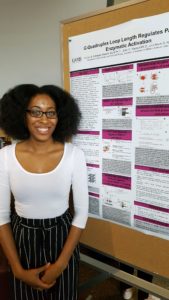
Andrea Edwards, 1st place Bhuvan Award
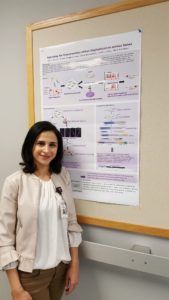
Duah Alkam, 2nd place Bhuvan Award
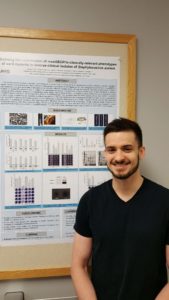
Joseph Rom, 3rd place Bhuvan Award

Dr. Zach Waldrip, 1st place postdoctoral category and 1st place overall
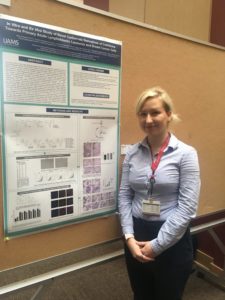
Dr. Alicja Urbaniak, 2nd place post-doctoral category
Brian Koss Receives Prestigious NCI Fellowship
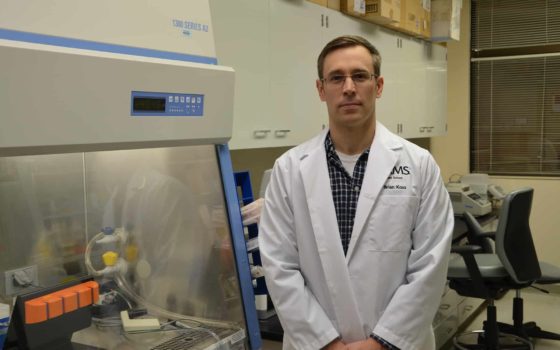
March 6, 2019 | A prestigious fellowship from the National Cancer Institute (NCI) will allow UAMS Graduate School student Brian Koss to advance his melanoma research.
The Ruth L. Kirschstein National Research Service Award for Individual Predoctoral Fellows (F31) will provide Koss with a three-year award of $124,851 to fund his research focusing on the protection of tumor-infiltrating immune cells in melanoma patients.
Koss, a third-year student in the UAMS Graduate Program in Interdisciplinary Biomedical Sciences, is now one of a select few scientists at UAMS ever to receive an F31 fellowship from the NCI.
“Becoming a National Cancer Institute-funded fellow has positioned Mr. Koss for immediate success during his graduate training, and also has primed him to become a nationally competitive cancer researcher in the future. These awards are highly competitive, so receiving this fellowship is a testament of Mr. Koss’s hard work, innovation and desire to help cancer patients in Arkansas and across our nation,” said Alan Tackett, Ph.D., associate director for basic research in the UAMS Winthrop P. Rockefeller Cancer Institute.
Koss is in his third year as a member of Tackett’s lab team at the UAMS Cancer Institute.
“Melanoma tumors apply many repressive factors on immune cells, which can prevent the success of standard immunotherapies,” Koss said.
Immunotherapy is a type of treatment that stimulates a person’s own immune system to recognize and destroy cancer cells. It has been found to be a very successful method of treatment for many, but not all, patients with melanoma, the deadliest form of skin cancer, and is now considered standard of care for the disease.
Koss’ research has revealed a method to protect immune cells in the harsh melanoma microenvironment which is known to prevent successful outcomes for some patients. His fellowship award will allow him to further define his findings and apply them to preclinical models of melanoma.
“This fellowship is impactful not only for Mr. Koss, but also for UAMS, as it highlights the innovative cancer research at the Winthrop P. Rockefeller Cancer Institute and supports our ongoing mission to become a National Cancer Institute-Designated Cancer Center,” Tackett said.
Cancer Institute Member Spotlight
March 1, 2019
Marie Burdine, Ph.D.
Assistant Professor
Department of Surgery, Division of Surgical Research
Department of Biochemistry and Molecular Biology (secondary appointment)
UAMS College of Medicine
Research Statement
Gastrointestinal cancers are particularly difficult to treat with reoccurrence and chemoresistance prevalent. It is the mission of the Burdine laboratory to work with surgical oncologists across UAMS campus to analyze the epigenetic profiles of gastrointestinal cancers in order to provide insight into the molecular mechanisms that drive gastrointestinal cancer progression and chemoresistance.
In addition, our laboratory focuses on the prevention of post-transplant lymphoproliferative disorder (PTLD), a type of lymphoma resulting from uncontrolled B cell proliferation and an unfortunate side effect of chronic immunosuppression in solid organ and hematopoietic stem cell transplant patients. We are investigating a novel form of immunosuppression that inhibits the proliferation of B cells and the production of donor-specific antibodies that contribute to antibody-mediated organ rejection. In vivo models of EBV-associated PTLD are used in the lab to determine the effectiveness of this immunosuppression therapy in PTLD prevention.
Dr. Burdine’s Grants
Winthrop P. Rockefeller Cancer Institute Foundation Envoys
Seeds of Science
$10,000*
2/2018-2/2019
A Novel Mechanism for Regulating the Oncogenic Activity of ATAD2
Marion B. Lyon New Scientist Development Award
$13,041*
5/2018 – 5/2020
Inhibition of DNA-PK(cs) as Novel Immunosuppression Therapy for Pediatric Transplant Patients
* cancer-related annual direct costs
UAMS Collaborators
Kevin Sexton, M.D. (Surgery)
Lyle Burdine, M.D., Ph.D. (Surgery)
Camilo Barreto, M.D. (Surgery)
Jill Mhyre, M.D. (Anesthesiology)
Nadir El Sharawi, M.D. (Anesthesiology)
Sara Shalin, M.D., Ph.D. (Dermatology, Pathology)
Felicia Allard, M.D. (Pathology)
Eric Yee, M.D. (Pathology)
Stephanie Byrum, Ph.D. (Bioinformatics Core)
External Collaborators
Michael Schulz, Ph.D. (Virginia Tech, Chemistry)
Brady Hall, Ph.D. (Virginia Tech, Chemistry)
Jay Chung, Ph.D. (NIH/NHLBI)
Anthony Davis, Ph.D. (UT Southwestern, Radiation Oncology)
Opportunities for Collaborations
I welcome collaborations with any scientist or clinician who is interested in analysis of human tumor samples for identifying novel therapeutic approaches. As part of the Division of Surgical Research, I would like to encourage any clinician with basic science ideas or novel procedural techniques to contact me to help get your project up and running.
You Might Not Know That …
I enjoy listening to 1310 The Ticket for sports news, as well as hiking, fishing and a building a campfire on a cool night!
Cancer-Related Publications
Schluterman, Burdine MK, Chapman SL, Korpanty G, Ozumi K, Fukai T, Yanagisawa H and Brekken RA. Loss of endogenous fibulin-5 inhibits pancreatic tumor growth by increasing the level of ROS in the tumor microenvironment. Dis Model Mech. 2010 May-Jun;3(5-6):333-42.
Burdine, L, Burdine MS, Moreland L, Fogel B, Orr LM, James J, Turnage RH, Tackett AJ. Proteomic Identification of DNA-PK Involvement within the RET Signaling Pathway. PLoS One. 2015 June 11;10(6)e0127943.
Kim Wiese A, Schluterman Burdine M, Turnage RH, Tackett AJ, Burdine LJ. DNA-PKcs controls calcineurin mediated IL-2 production in T lymphocytes. PLoS One. 2017 Jul 27;12(7):e0181608.
February Publications
Proteomic Characterization of the Arsenic Response Locus in S. cerevisiae.
West KL, Byrum SD, Mackintosh SG, Edmondson RD, Taverna SD, Tackett AJ.
Epigenetics.
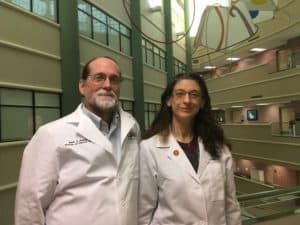 The melanocortin pathway and control of appetite-progress and therapeutic implications.
The melanocortin pathway and control of appetite-progress and therapeutic implications.
Baldini G, Phelan KD.
J Endocrinol.
Congratulations Dr. Davis!
Congratulations to Lauren Davis who successfully defended her dissertation entitled “Histone Posttranslational Modifications as Diagnostic Markers for Melanoma” on February 20th. Lauren is a student in Alan Tackett’s lab.

